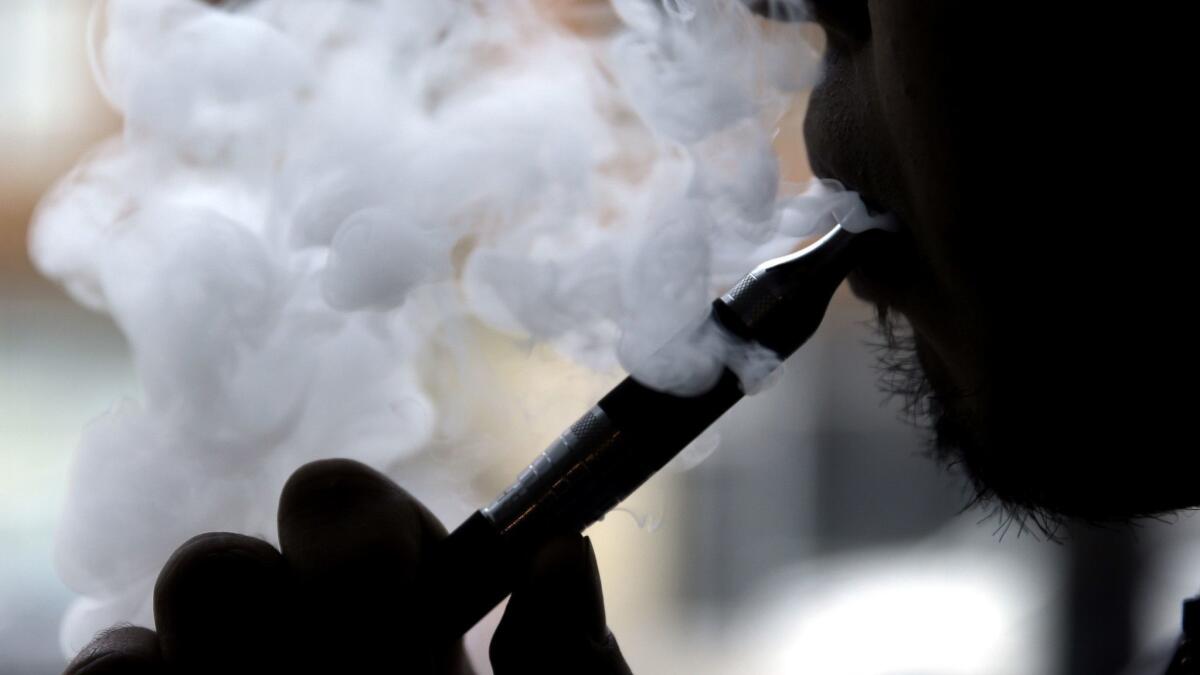FDA expected to impose severe restrictions on e-cigarettes

- Share via
Reporting from Washington — The Food and Drug Administration, alarmed by a huge increase in vaping among minors, is expected to impose severe restrictions on the sale of most e-cigarettes products throughout the United States — actions that will likely have a significant effect on an industry that has grown exponentially in recent years with little government oversight.
As soon as next week, FDA Commissioner Scott Gottlieb is expected to announce a ban on the sale of flavored e-cigarettes — the majority of vaping products sold — in tens of thousands of convenience stores and gas stations across the country, according to senior agency officials. According to its officials, the agency will also impose such rules as age-verification requirements for online sales.
The FDA moves are being spurred by preliminary government data showing that e-cigarette use has risen 77% among high-schoolers and nearly 50% among middle-schoolers in 2018. That means 3.5 million children were vaping in early 2018, up 1 million from 2017.
Gottlieb, who once served on the board of a North Carolina vaping company, was at one time viewed as an ally of the e-cigarette industry, and delayed some critical e-cigarette rules shortly after becoming commissioner in 2017. But he has also said his first priority is protecting kids from tobacco-related disease.
“We now have evidence that a new generation is being addicted to nicotine, and we can’t tolerate that,” he said, referring to the vaping data in an interview before he made final decisions on e-cigarette policy.
The only exception to the flavored products ban in convenience stores involves menthol e-cigarette products. The FDA will continue to permit that flavor to be sold because menthol is permitted in regular cigarettes as well, and the agency doesn’t want to give traditional cigarettes an advantage over e-cigarettes in the retail setting.
Gottlieb’s actions are focused on a specific kind of vaping product that dominates the market — e-cigarettes that use prepackaged flavor cartridges, or pods. That includes the wildly popular vaping products by Juul Labs Inc. The restrictions don’t apply to the “open-tank” systems available in vape shops.
Research indicates that many e-cigarette users are likely to get addicted to nicotine and that some will likely end up on regular cigarettes, a product that kills half its long-term users. Moreover, the long-term health consequences of vaping are not known.
At the same time, vaping devotees and “harm reduction” advocates have said that e-cigarettes represent a powerful tool in helping adult smokers to quit more dangerous cigarettes. They have warned that making it harder for adults to buy e-cigarettes — or depriving them of flavored products — will be detrimental.
“We have to be really careful not to overreact to the youth problem,” said David Abrams, a professor of social and behavioral sciences at New York University.
Juul, which accounts for more than 70% of the retail market, is sold in tens of thousands of retail outlets.
Gottlieb’s steps will almost certainly be denounced as too aggressive by the industry and too weak by public health groups and Democratic lawmakers, whose election victory will likely embolden them in efforts to curb youths’ use of e-cigarettes.
More to Read
Sign up for Essential California
The most important California stories and recommendations in your inbox every morning.
You may occasionally receive promotional content from the Los Angeles Times.










